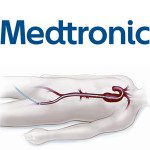 Medtronic (NYSE:MDT) today touted follow-up data from the Valor II study of its Valiant stent graft, saying patients with descending thoracic aortic aneurysms showed 94.8% freedom from aneurysm-related mortality at 5 years.
Medtronic (NYSE:MDT) today touted follow-up data from the Valor II study of its Valiant stent graft, saying patients with descending thoracic aortic aneurysms showed 94.8% freedom from aneurysm-related mortality at 5 years.
Fridley, Minn.-based Medtronic, which originally won PMA approval for Valiant in April 2011, said the results show the durability of the Valiant device. The Valor II study, a prospective, single-arm trial involving 160 patients in the U.S., met its primary safety and efficacy endpoints back in 2011 with an overall mortality rate of 12.6% and a 97% success rate at 12 months.
The follow-up data showed a 1.3% rupture rate, a 6.9% secondary procedure rate and an 89.3% rate of stable or decreased aneurysm size. Only 1 patient (0.6%) needed conversion to an open procedure, Medtronic said.
“The Valiant system leverages Medtronic’s 17 years of thoracic stent graft experience and innovation, and is proven in more than 70,000 patients,” aortic business general manager Daveen Chopra said in prepared remarks. “The Valor II study proves the durability of the system and our commitment to clinical research and improving patient outcomes with an objective to settle for nothing less.”
“The 5-year results from Valor II provide confidence to physicians treating patients with descending TAA, in the durability and effectiveness of the Valiant thoracic stent graft system,” added principal investigator Dr. Mark Conrad of Boston’s Mass. General Hospital, who presented the results Oct. 2 at the annual meeting of the New England Society for Vascular Surgery in Newport. “The 5-year data demonstrate a high rate of freedom from aneurysm-related mortality and rare incidences of rupture or conversion to open surgery.”
The Valiant device won an expanded indication from the FDA in November 2012 and another in January 2014.

